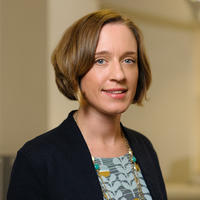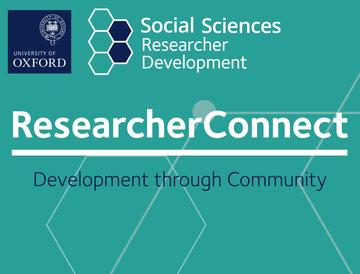Developing Researcher Connections
RD Blog
Author
Dr Eleanor Pritchard
Researcher Development Coordinator
Social Sciences Division

Developing Researcher Connections
The pandemic both removed and created opportunities for SSD researchers to connect with one another.
Our priority in the early stages of the pandemic was to move our – previously entirely in-person - programme online. This brought significant benefits, which included being able to increase capacity for some sessions, open sessions to researchers dispersed around the world, and welcome participants with additional support needs who might have found it difficult to attend in-person sessions.
A notable disbenefit, the impact of which – I think – has grown over time, was that we lost much of the horizontal connection between participants, which we’ve been told was really valued about our courses. The serendipitous connections which arise from random seating choices, from your position in a coffee queue, from a quirky aside someone on your table makes during a group activity. The more organic side of researcher development which happens when you bring together a group of people for a shared purpose and can lead to friendships and even collaborations. Online delivery doesn’t comfortably allow for parallel conversations, or relaxed mingling (although if you’ve seen either working well anywhere, I’d love to hear from you, please!).
Pre-Covid, we had thriving programmes under the umbrella ‘ResearcherConnect’ which brought researchers together around various themes of experience; during Covid we’ve been able to sustain some of these online.
Today, as a programme provider looking forward into Hilary and considering mode(s) of delivery, I’m reflecting on the holistic experience and benefits I hope researchers will take away from each of our courses and events, and exploring different permutations. It’s clear to me that we need to retain what’s been good about online delivery, while minimising (as far as possible) the downsides, and re-engaging with in-person delivery where that can add value to the content for participants.
To that end, we’re cultivating a 2022 ResearcherConnect suite that seeks to broaden the ways in which researchers can connect around vital themes, and is as inclusive and open as possible.
Collaborative working has proved very popular: The Academic Writing Community (AWC), will continue on Fridays and, from this term, is complemented by the Co-Working Community (CWC) on Mondays. The CWC was created in response to a suggestion from incoming PRS students who wanted to work together, but aren’t necessarily in full writing mode yet. It’s open to all and is already proving a warm, supportive and fruitful start to the week for many. Both the AWC and CWC sessions will remain online for the foreseeable future, as we’re seeing many researchers joining from their preferred workspaces; but members of both communities have expressed interest in augmenting this with face-to-face meetups in Oxford once or twice a term, and we look forward to facilitating this.
From next month, we’ll extend this theme of ‘building collective momentum’ extended with guided Quarterly Review workshops, which are an invitation to take a look back at what’s happened over the past quarter, take stock, and develop an actionable plan for the coming quarter. It’ll be online, and as social as we can make it; it’s a rare chance to step outside your day-to-day without getting overwhelmed by the bigger picture, and set your priorities and goals. I hope you’ll be able to join us: booking details to follow in the Week 7 newsletter.

The Professional Perspectives Network, which at present exists as an online network with its own Microsoft Teams group, is growing rapidly, and thinking about ways to support researchers with a professional hinterland sharing effective ways of working, and leveraging their professional expertise to the benefit of their academic research. We’re looking forward to being able to incorporate an additional in-person strand of activity for this network next term.
From next term (Hilary ’22), researchers interested in developing their teaching while at Oxford, who have attended the divisional ILTO course (or a departmental equivalent) will have access to a series of expert panel discussions on different aspects of teaching, delivered by teaching academics from across the division. These will be online to maximise attendance capacity, and will be complemented by twice termly ‘teaching cafes’ to be held in-person in Oxford to network and share experiences.
Finally, our popular coffee walks continue as social spaces of connection, but for anyone outside the city who would like to virtually join us, we’ll be live tweeting photographs from the walks so you can share with the walkers the changing landscape, if not (sadly) the excellent coffee!
As we move, with reflection and intention, to a steady-state Researcher Development programme that maximises the opportunities for connection and peer-to-peer engagement, I’d welcome your comments, thoughts and suggestions about good practice, opportunities, or ways we could better serve you in building a connected community of researchers across the Social Sciences Division.



